8A Unit 4 Reading(2) 导学稿
牛津译林版英语八年级上册Unit4_reading_2教学设计

牛津译林版英语八年级上册Unit4_reading_2教学设计一. 教材分析牛津译林版英语八年级上册Unit4 reading 2主要介绍了关于保护环境的重要性。
通过一个关于澳大利亚野狗的故事,让学生了解环境保护的紧迫性和方法。
教材内容丰富,插图生动,易于激发学生的学习兴趣。
本课主要目的是让学生掌握环境保护的相关词汇和表达方式,提高学生的阅读理解能力。
二. 学情分析八年级的学生已经具备一定的英语基础,对于环境保护这个话题也有一定的了解。
但学生在阅读长篇文章时,可能会遇到生词和复杂句子结构的障碍,因此需要教师在教学中给予适当的引导和帮助。
此外,学生对于实际环境保护行动的参与度有待提高。
三. 教学目标1.知识目标:学生能够掌握文章中的关键词汇和表达方式,理解文章的主旨大意。
2.能力目标:学生能够提高阅读理解能力,学会从文章中获取有用信息。
3.情感目标:学生能够认识到环境保护的重要性,自觉参与环境保护行动。
四. 教学重难点1.重点:学生能够理解文章内容,掌握关键词汇和表达方式。
2.难点:学生能够运用所学知识,进行实际的环境保护行动。
五. 教学方法1.任务型教学法:通过设置各种任务,激发学生的学习兴趣,提高学生的参与度。
2.情境教学法:创设真实的环境保护情境,让学生在实践中学会运用英语。
3.合作学习法:鼓励学生分组讨论,培养学生的团队协作能力。
六. 教学准备1.教师准备:提前熟悉教材内容,准备好相关的教学材料和课件。
2.学生准备:预习教材,了解文章大致内容。
七. 教学过程1.导入(5分钟)利用图片或视频展示澳大利亚野狗的形象,引导学生关注环境保护话题。
教师提问:“你们认为环境保护重要吗?为什么?”让学生发表自己的看法。
2.呈现(10分钟)教师简要介绍文章内容,然后让学生阅读文章,注意遇到生词和复杂句子结构时,可以先略过,整体理解文章大意。
3.操练(15分钟)学生分角色朗读文章,注意模仿语音语调。
教师提问:“你们在阅读过程中遇到了哪些生词和困难?”引导学生分享学习心得。
牛津译林版8A Unit4 Reading 教案-最新教育文档

课题 Unit4主班级姓名学号【教学目标】1. To know some vocabulary about DIY.2. To understand the meaning of the article.3. To lead the students to DIY.【教学重难点】重点:language points难点:【学时安排】一课时【教学方法】reading/ exercises【教学过程】第一段自主学习1.导入新课1. Do you like DIY?2. Have you ever tried DIY? What is it?3. Do you want to take a course in DIY?2.学生自学3.自学检测第 1 页4.反馈纠错第二段问题探究5.问题探究问题(一)1. Skim the article, then answer the question: What’s the article mainly about?2. Divide the article into three parts.问题(二)1. Read the article carefully, and underline the difficult words and phrases.问题(三)Read the article again, then tell whether the statements are true or false.6.课堂质疑7.课堂小结第三段当堂检测8.课堂检测一、根据中文或首字母提示写出单词。
1. Builders spent several weeks (to fix something that is damaged,第 2 页broken)the roof and pipe.2.A large bouquet of r arrived on her desk.3.I know this idea sounds (狂热的),but it may be worth a try.4.I (建议) you to think very carefully before making any decision.5.I’m taking a (课程) in graphic design.6.Is it (已经) 5 o’clock?7.Mr.Black is ill ,so he is taking his class i .8.Only 12 people a the meeting.9.I remember (曾经)it snowed on my birthday, and I was so excited.10.There is a light hanging form the (天花板).11.He’s poor at spelling. He made a lot of spelling m in his writing.12.He is a c man. He spends all his money on stamps.13.They makes (管子) for the oil factory.14.I want to take a c in DIY.15.There are some books on the (架子).二、用所给词的适当形式填空。
八年级英语上册 Chapter 4 Reading教学设计 第二课时
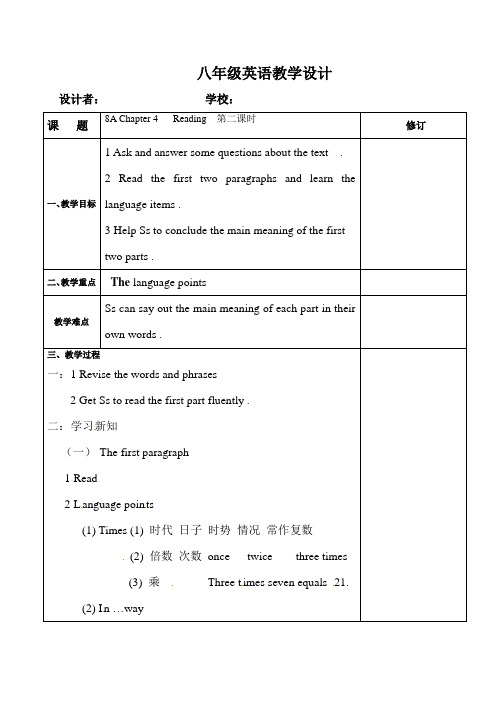
设计者:学校:
课题
8A Chapter 4 Reading第二课时
修订
一、教学目标
1 Ask and answer some questions about the text .
2 Read the first two paragraphs and learn the language items .
3 Help Ss to conclude the main meaning of the first two parts .
二、教学重点
Thelanguage points
教学难点
Ss can say out the main meaning of each part in their own words .
三、教学过程
一:1 Revise the words and phrases
2 Get Ss to read the first part fluently .
二:学习 新知
(一)The first paragraph
1 Read
2 L anguage poin ts
(1)Times (1)时代日子时势情况常作复数
三Homework
Remember the language points
(二) The second paragraph
1 Read
2 Language points
(1 )the system of numbers
(2)consist of = be made up of
(3)from …t o …
(4)invent ----invention ------inventor
8A Unit 4 Reading II 教案1
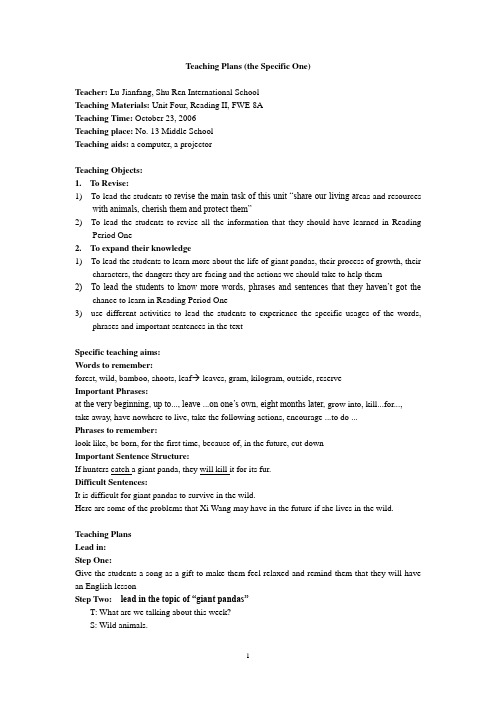
Teaching Plans (the Specific One)Teacher: Lu Jianfang, Shu Ren International SchoolTeaching Materials: Unit Four, Reading II, FWE 8ATeaching Time: October 23, 2006Teaching place: No. 13 Middle SchoolTeaching aids: a computer, a projectorTeaching Objects:1.To Revise:1) To lead the students t o revise the main task of this unit “share our living ar eas and resourceswith animals, cherish them and protect them”2) To lead the students to revise all the information that they should have learned in ReadingPeriod One2. To expand their knowledge1) To lead the students to learn more about the life of giant pandas, their process of growth, theircharacters, the dangers they are facing and the actions we should take to help them2) To lead the students to know more words, phrases and sentences that they haven’t got thechance to learn in Reading Period One3) use different activities to lead the students to experience the specific usages of the words,phrases and important sentences in the textSpecific teaching aims:Words to remember:forest, wild, bamboo, shoots, leaf leaves, gram, kilogram, outside, reserveImportant Phrases:at the very beginning, up to..., leave ...on one’s own, eight months later, grow into, kill...for..., take away, have nowhere to live, take the following actions, encourage ...to do ...Phrases to remember:look like, be born, for the first time, because of, in the future, cut downImportant Sentence Structure:If hunters catch a giant panda, they will kill it for its fur.Difficult Sentences:It is difficult for giant pandas to survive in the wild.Here are some of the problems that Xi Wang may have in the future if she lives in the wild.Teaching PlansLead in:Step One:Give the students a song as a gift to make them feel relaxed and remind them that they will have an English lessonStep Two: lead in the topic of “giant pandas”T: What are we talking about this week?S: Wild animals.T: What is your favorite animal?S: ...T: Can you guess what my favorite animal is?S: ...T: Giant pandas. (showing them a doll panda)Step Three: Lead in the revision of readingT: OK. Let’s start our lesson.(an E-mail appears on the screen)T: Oh, what is this?S: An e-mail.T: Who sent the e-mail to me?S: Wolong giant panda reserve.T: What did it say?S: Would you like to join our club?T: Would you?S: Yes, I’d love to.four levels appear on the screen→ lead the students to read themT: Oh, you have four levels to pass. Do you want to have a try?S: Yes.T: Now, let’s go.Practice: use four steps to revise all the information of Xi Wang and lead in specific usage of words and phrases1.the growth of Xi Wang2.the characters of Xi Wang3.the dangers that she is facing4.the actions that people should take to helpStep One:Level one (the growth of Xi Wang) → to revise important words in reading and use more exercises to lead the students to practice using them1.1) 10 days old:show a picture of a baby panda →the usage of “gram”T: How much did she weigh?S: She weighed 100 grams.2) at four months oldshow a picture of a panda at about four months old → the usage of “ kilogram”T: How much did she weigh?S: She weighed 10 kilograms.use super link to link to the exercises of “gram, kilogram”1 kilogram = _________ grams (1000)A 12-month-old panda weighs about 35 __________. (kilograms, grams) (kilograms)2) show a picture of a panda at about four moths old, staying outside in the wild → the usage of“ outside”T: What did she start to do?S: She started to go outside her home.use super link to link to the exercises of “outside”Giant panda reserves are always _______ the city.A. insideB. outsideC. onD. in (B)2.at six months old1) show a picture of a panda at about six months old -> the usage of “bamboo shoots and leaves”T: What did she start to eat?S: She started to eat bamboo shoots and leaves.use super link to link to the exercises of “bamboo shoots and leaves”A six-month-old panda eats b________ s_________.A 20-month-old panda likes bamboo _______ (leaf) better. (leaves)2)show a picture of a panda sitting in a forest →the usage of “forest, reserve”T: Where can giant pandas get bamboo shoots and leaves?S: In a forest.T: Where can they find a forest?S: In a panda reserve.use super link to link to the exercises of “forest, reserve”three pictures appear on the screenWhich is a forest? (C)T: What about the second one?S: It is the wild.T: Do you know any panda reserves?S: Yes. Wolong Panda Reserve.e pictures to practice reading those words we have just revisedStep Two:Level two (characters of Xi Wang) → to revise the usage of important phrases1.show a picture of a baby panda drinking her mother’s milk →“at the very beginning”T: When did she start to drink her mother’s milk?S: At the very beginning.use super link to link to the exercises of “at the very beginning”在一开始的时候, 熊猫看上去像是只白老鼠._____________________, the baby panda looked like a white mouse. (At the very beginning) 2.lead in the usage of “up to”T: How long did she drink her mother’s milk a day?S: For up to 14 hours a day.use super link to link to the exe rcises of “up to”What does “up to” mean?(B)A. at leastB. as many asC. aboutD. more thanpare two pictures to lead in the usage of “leave, leave ...on one’s own”T: Look at these pictures carefully, can you find the difference?S: ...T: Who is with Xi Wang in the first picture?S: Her friends. Her mother.T: Her mother. But where is she in the second picture?S: She left Xi Wang because she had another baby.T: So leave→ left.T: Yes, her mother left her for two whole days on her own.use super link to link to the usage of “leave, leave ...on one’s own”What does “leave” mean in each of the two sentences?离开→让某人独处pare four pictures to lead in the usage of “grow, grow up, grow into”T: Look at the screen carefully. What happened?S: She grew into a healthy young giant panda.use super link to link to the usage of “grow, grow up, grow into”Xi Wang _______ (grow) quickly.Soon she has ________(grown up, grown into).Now she has ________(grown up, grown into) a healthy young giant panda.(grows, grown up, grown into)5. use an extra exercise to give a conclusion of what we have learned in level twoask the students to finish the extra exercises one (use the following phrases to fill in the blanks) on students learning aidsFill in the blanks with the correct phrases:20 months later, grow into, at the very beginning, up to, leave ...on one’s own1). During Xi Wang’s childhood, she drank her mother’s milk for _______four months.2). It is difficult for pandas to ________ a healthy young panda because of too many hunters.3). ___________________, Xi Wang was very small and weak.4). ___________________, her mother had another baby so she had to look after herself.5). Mother pandas like to _____their children ____________when they are 20 months old.Step Three:Level three (pandas’ dangers and actions)→ to revise the left parts of important phrases and the sentence structure “if sb. do/does..., sb will do....”1. T: If hunters catch a giant panda, what will they do?S: If hunters catch a giant panda, they will kill it for its fur.practice “if” clause, using “ if farmers cut down trees and forests,if people find baby pandas alone,”e pictures to revise the phrases “kill...for..., have nowhere to live”and “if” clauseTwo pictures of hunters killing pandas for their fur appear on the screenT: Oh, what happened again? Two pictures. I am near-sighted. Can you describe them for me? S: If hunters catch giant pandas, they will kill them for their fur.Another two pictures showing the fact that pandas have nowhere to live appear on the screen T: What about these two pictures?S: If farmers cut down trees and forests, giant pandas will have nowhere to live.e a song to lead in other problems that pandas are facingT: Do you know any other problems that pandas are facing?S: ...show the students a song to lead in the problem of “ flowers on bamboos’ coming out”T: What problems can you find?S: Flowers on bamboos come out.T: If flowers on bamboos come out, pandas will have nothing to eat.T: If we do nothing, what will happen?S: If we do nothing, soon there will be no giant pandas in the world.4.lead in the actions we can take to protect pandas lead in the phrases “ encourage...to do ...”T: So what actions can we take to help pandas?S: We can encourage farmers to leave the reserves.T: What other actions can you take to protect pandas?S: ...T: What is the best one?S: ...T: We should encourage more people to join our club.You can e-mail us at Wolong@5.practice reading the words and phrases we have learned just nowStep Four:Level four ( to be a good reporter)1. there are some other useful phrases in the passage which are important but with no need to explain their usages. So we lead the students to find those phrases and underline them2. there are two important sentences in the passage, lead the students to find them and learn totranslate them into ChineseIt is difficult for giants pandas to survive in the wild. 对大熊猫来说生存在野外很困难.Here are some of the problems that Xi Wang may have in the future if she lives in the wild.以下是希望将来的野外生存中会遇到的麻烦.4.lead the students to read the words and phrases on the blackboardkilogram outsideleaf leaves survive forest action protect reserve look likebe bornfor the first timegrow intobamboo shoots and leaves in the futureleave ...on one’s own encourage ...to do ...T: Do you want to be a reporter when you grow up?S: Yes.T: Would you like to be a good reporter for giant pandas?You know, pronunciation is very important for a good reporter. Do you think so?S: Yes.T: So now let’s read these words and phrases after me.4. lead them to read the text with the tapeFollow ups: show time:tell students rules and give them key wordsTopics: 话题1. The growth of pandasbe born, gram, at four months old, kilograms, eight months later, grow into, up to, bamboo shoots and leaves2. the dangers they havehunters, kill...for..., farmers, have nowhere to live, take away,3. the actions we should taketake the following actions, encourage...to do ...Rules: 规则1.Students in Line 1&2 talk about the first topic2.Students in Line 3&4 talk about the second topic3.Students in Line 5&6 talk about the third topic4.Work in groups of four5.Choose one of you to talk about that topicSum up: Finish doing Part D on page 62, unit four FWEgive them a certificate of joining the club and give them a gift which is the exercises Part D on the textbookHomework:Finish exercises on page 59-60Read the text twiceSurf on the internet to find more information about pandasPostscript:1. The using of “an e-mail from Wolong Panda Reserve” to combine the whole teaching is useful.2. The using of “teaching the specific usages of words, phrases and sentence structures by revising the life of Xi Wang” is useful.3. It is bette r to choose another song named “heal the world” to lead in the topic “we should protect animals and the world”.4. It is better to divide the class into teams and lead them to compete and thus the learning atmosphere will be better.Blackboard Designkilogram outsideleaf leaves survive forest action protect reserve look likebe bornfor the first timegrow intobamboo shoots and leaves in the futureleave ...on one’s own encourage ...to do ...Students’ Learning AidsTeaching Aims:教学目标Words: forest, wild, bamboo, shoots, leaf leaves, gram, kilogram, outside, reserveImportant Phrases: at the very beginning, up to..., leave ...on one’s own, eight months later, grow into, kill...for..., take away, have nowhere to live, take the following actions,encourage ...to do ...Other Phrases: look like, be born, for the first time, because of, in the future, cut down Important Sentence Structure:If hunters catch a giant panda, they will kill it for its fur.Difficult Sentences:It is difficult for giant pandas to survive in the wild.Here are some of the problems that Xi Wang may have in the future if she lives in the wild.Main Task:情感目标arouse students’ love for giant pandas and thus try their best to help giant pandasExtra Exercises:1.Fill in the blanks with the correct phrases:20 months later, grow into, at the very beginning, up to, leave ...on one’s own1). During Xi Wang’s childhood, she drank her mother’s milk for _______four months.2). It is difficult for pandas to ________ a healthy young panda because of too many hunters.3). ___________________, Xi Wang was very small and weak.4). ___________________, her mother had another baby so she had to look after herself.5). Mother pandas like to _____their children ____________when they are 20 months old.2. Show TimeLevel Four: to be a good reporter for giant pandasTopics: 话题1. The growth of pandasbe born, gram, at four months old, kilograms, eight months later, grow into, up to, bamboo shoots and leaves2. the dangers they havehunters, kill...for..., farmers, have nowhere to live, take away,3. the actions we should taketake the following actions, encourage...to do ...Rules: 规则1.Students in Line 1&2 talk about the first topic2.Students in Line 3&4 talk about the second topic3.Students in Line 5&6 talk about the third topic4.Work in groups of four5.Choose one of you to talk about that topic。
译林牛津版8A unit 4 reading 2公开课教学课件共21张PPT

To read some books about DIY and take a course in DIY.
17
DIY lessons:
Want to pu安t i装n a电li灯ght? Want to rep修ai理r t水he管pipe? Don’t know how to deal with a po停w电er cut? We a建dv议ise you to t修ak一e a门co课u程rse in DIY. You can attend lessons every weekend. Call us on 8822 1234!
18
put in a brighter light make a mistake have a power cut
put up a picture hit a pipe
fill the room with water
1Hd.eW Iecfohloravyatetoseduhothoeowisusrashehneepotaulysiorteovo.etuh?rdisnegesclfoa,rnadte a What will you do?
2T.hHeowhoiussehisalwDaIyYs wloorks? terrible.
If1Hd.eWeycoohloruavatetwsedeotheroisesrhehAepoaunlsiodrevr.eteh?iwng’ss
and
mother,
Would you be happy?
2T.hHWeowhhoaiustsehwisaolwDuaIldyYs wyloooruks?dtoe?rrible.
8A 《Unit4 Reading》教学设计-优质教案

教师活动
学生活动
环节一:(根据课堂教与学的程序安排)
教师活动1
呈现:教师说词
呈现课文中的图片
课本p45的B1和B2部分练习
学生活动1
学生猜测词义、教师领读、学生加深理解
活动意图说明:
展示单词,吸引学生,自己猜测词义,加深理解。
环节二:
教师活动2
操练:播放p44课文录音,学生看p46的B3部分
4.学习重点难点
学习相关词汇,理解文章内容。
5.学习评价设计
(从知识获得、能力提升、学习态度、学习方法、思维发展、价值观念培育等方面设计过程性评价的内容、方式与工具等,通过评价持续促进课堂学习深入,突出诊断性、表现性、激励性。体现学科核心素养发展的进阶,课时的学习评价是单元学习过程性评价的细化,要适量、适度,评价不应中断学生学习活动,通过学生的行为表现判断学习目标的达成度)
2.单元(或主题)学习目标与重点难点
学习常用工具的名称,学会用英语就DIY的话题展开对话;学习DIY相关词汇,读懂并能理解文章的内容,完成相关练习,引导学生的意识;学会祈使句的表达,学会提出建议。
3.单元(或主题)整体教学思路(教学结构图)
安排2课时,ReadingI和ReadingII,第一课时学生对相关词汇,词组,句型的练习和理解,按照呈现、操练、阅读的步骤进行。第二课时在第一课时的基础上,学生进一步操练,师生之间互相活动等方式来学习!教师最后总结这个主题部分的得与失!
第1课时教学设计(其他课时同)
课题
ReadingI
课型
新授课☑章/单元复习课□专题复习课□
习题/试卷讲评课□ 学科实践活动课□ 其他□
1.教学内容分析
本课时,学生通过Suzy讲述的故事了解她表哥Andrew的DIY趣事。
(译林版)8A Unit 4 Reading 2 优秀课件

in his bedroom
__h_a_d_a_p_o_w_er__cu_t________.
He _p_ut_u_p_a__p_ic_tu_r_e_______ He _h_it_a_p_i_pe__ and f_il_le_d
on his bedroom wall.
the room _w_i_th__w_a_te_r__.
What a __te_r_r_ib_l_e(可怕的)rainstorm ! It is__t_e_r_ri_b_ly(terrible) cold today.
Retell the story in Para 2.
Put in a brighter light Make a mistake Have a power cut Put up a picture Fill …with…
and _d__e_c_o_r_a_t_e__ his house. But when he finishes, the house always looks _t_e_r_ri_b_l_e__.
He once wanted to put in a brighter lighte, but the whole house
单项选择。
1. — Allen, your bedroom is in a mess (乱七八糟).
— Sorry, Mum I’ll ______ my things at once.
A. put on
B. put away
C. put out
D. put up
2. — Who ______the big fire at last?-----Zhang Hua did.
Talk about Para.5.
八年级 英语Unit4 Reading 最佳教案导学案教学设计
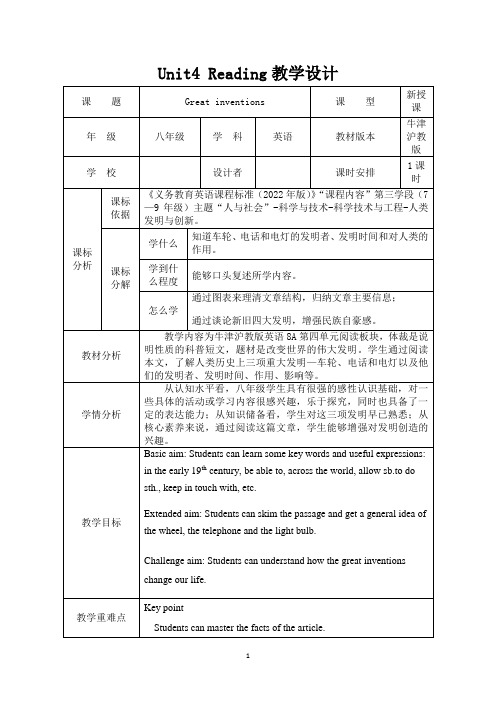
Skimming B Before you read.(P50)
While-reading
Task1.Read the article and complete the chart below.
Invention
The wheel
The telephone
The light bulb
Extended aim: Studentscan skim the passage and get a general idea of the wheel, the telephone and the light bulb.
Challenge aim: Studentscan understand how the great inventions change our life.
课标分解
学什么
知道车轮、电话和电灯的发明者、发明时间和对人类的作用。
学到什么程度
能够口头复述所学内容。
怎么学
通过图表来理清文章结构,归纳文章主要信息;
通过谈论新旧四大发明,增强民族自豪感。
教材分析
教学内容为牛津沪教版英语8A第四单元阅读板块,体裁是说明性质的科普短文,题材是改变世界的伟大发明。学生通过阅读本文,了解人类历史上三项重大发明—车轮、电话和电灯以及他们的发明者、发明时间、作用、影响等。
Inventor
When was it invented
Life before its invention
Life after its invention
Task 2 Complete ExD2 on P53.
根据文本由已知推断出未知
通过图表理清主阅读篇章结构,归纳文章内容
说课课题 8A Unit4 Reading

说课课题8A Unit4 Reading一、说教材(一)教学内容、地位和作用我说课的内容是牛津英语8A第四单元的一篇阅读课文The story of Xi Wang。
这篇阅读课文主要由三部分组成:熊猫“希望”的成长过程、熊猫现实中的生存危机、保护大熊猫的措施。
前几个单元分别是有关friend,school life,a day out的,逐渐把学生的眼光投入到自然界中,同时为下一单元的鸟类世界的主题,打下铺垫。
(二)教学重点及难点此课为阅读课,教学重点因此也是在学生完成各教学任务的基础上,努力提高学生的阅读能力;本课最大的难点是在把握全文意思的基础上对文章材料做整理和归纳。
二、说教学目标(一)知识与技能目标掌握有关wild animals话题和本文中出现的新单词。
通过细读,以往经验和上下文了解文章大意。
(二)过程与方法通过合作学习,探究学习,及设置一定任务,让学生完成熊猫的成长简历,以便更好的保护大熊猫来达到知识与技能目标中的要求。
(三)情感态度和价值观本课旨在培养学生热爱自然的朴素情感,激发他们保护熊猫,保护环境的热情和道德意识。
三、说教法、学法(一)任务型学习新课标开宗明义指出,新课程倡导体验,实践,合作,参与交流的学习方式和任务型学习。
(二)合作型学习是以小组学习为活动,全班为了实现同一目标共同努力的学习模式。
(三)探究型学习是以学生为主体,教师为主导,探究活动为主线的,提高学生创新意识,创新精神,发现问题和解决问题的能力。
四、说教学流程(一)教学准备PPT课件(二)教学流程Step 1. Lead-in提供一些谜语猜测动物名称such as: What animal looks like a cat and with yellow fur and black strips (tiger); What animal lives in the sea and give shows to people (dolphin),etc.依次呈现bear, kangaroo, squirrel, panda .由最后一个谜语panda导入课文。
8A U4 Reading(2)公开课课件-精品课件ppt
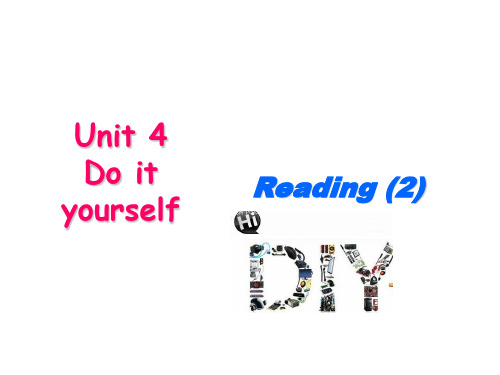
Task 5:Related exeacise( 见练习)
Task 6 :Further thinking
It can save money. It can make us more creative(有创造力的) It can bring us the feelings of success(成就感)
Putting up a (7)_______ above the bed
The books couldn’t stay there
because one end wasn’t as (8)____as the other
Advice : Reading more books about DIY and(9)________a course in DIY Result : My cousin knows (10)________ about DIY than me.
1. Suzy’s cousin loves doing DIY. 2. Suzy’s cousin failed to put in a new light in
his bedroom. 3. Suzy’s cousin put a picture oonn athpeipwea.ll. 4. Suzy’s cousin thought thelicvaintgwas boring,
Unit 4 Do it yourself
Reading (2)
Task 1:Retelling the story put in…make…have…
put up …hit/fill…
paint…stop…keep…have…
want…spend…put…stay…
Task 2: Revision(B3+B4)
8AUnit4Reading(2)
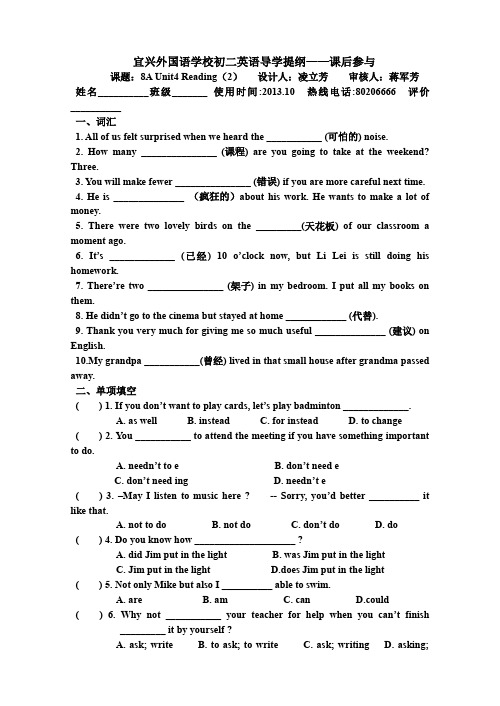
宜兴外国语学校初二英语导学提纲——课后参与课题:8A Unit4 Reading(2)设计人:凌立芳审核人:蒋军芳姓名__________班级_______ 使用时间:2013.10 热线电话:80206666 评价__________一、词汇1. All of us felt surprised when we heard the ___________ (可怕的) noise.2. How many _______________ (课程) are you going to take at the weekend? Three.3. You will make fewer _______________ (错误) if you are more careful next time.4. He is ______________ (疯狂的)about his work. He wants to make a lot of money.5. There were two lovely birds on the _________(天花板) of our classroom a moment ago.6. It’s _____________ (已经) 10 o’clock now, but Li Lei is still doing his homework.7. There’re two _______________ (架子) in my bedroom. I put all my books on them.8. He didn’t go to the cinema but stayed at home ____________ (代替).9. Thank you very much for giving me so much useful ______________ (建议) on English.10.My grandpa ___________(曾经) lived in that small house after grandma passed away.二、单项填空( ) 1. If you don’t want to play cards, let’s play badminton _____________.A. as wellB. insteadC. for insteadD. to change ( ) 2. You___________ to attend the meeting if you have something important to do.A. needn’t to eB. don’t need eC. don’t need ingD. needn’t e( ) 3. –May I listen to music here ? -- Sorry, you’d better __________ it like that.A. not to doB. not doC. don’t doD. do ( ) 4. Do you know how ____________________ ?A. did Jim put in the lightB. was Jim put in the lightC. Jim put in the lightD.does Jim put in the light( ) 5. Not only Mike but also I __________ able to swim.A. areB. amC. canD.could( ) 6. Why not ___________ your teacher for help when you can’t finish _________ it by yourself ?A. ask; writeB. to ask; to writeC. ask; writingD. asking;write( ) 7. I can’t hear what you are saying __________.Would you speak loudly?A. happilyB. quicklyC. clearlyD. slowly ( ) 8. My uncle helped me ___________ two special lights in my bedroom after we moved into the new flat.A. get onB. take inC. put inD. turn up ( ) 9. -What did Mr Liu say to you before I came into the classroom?-He _______ me to look up the word in a dictionary if I don’t know the meaning.A. saidB. spokeC. toldD. let( ) 10. He was ill yesterday but he went to school ____________ at home.A. instead of stayB. instead to stayC. instead of stayingD. to instead of staying三、动词填空1. Tomorrow I _______________ (attend) an important meeting in Nanjing.2. The doctor did what he could _____________ (save) the dying man.3. My teacher often ______________ (advise) me _____________ (read) English loudly.4. Who _____________ (fill) the bottle with water? There is too much water in it.5. At this moment ,these women _________________(enjoy) themselves in the new market.6. We spent more than two hours ______________ (repair) this washing machine.7. Y ou _______________ (make) more mistakes if you _____________ (not be) careful.8. My father ______________ (teach) himself French when he was young.9. Keep on _____________ (try) and I’m sure you’ll pass the middle exam.10. You’d better ________________ (not stay) outside at night. It’s dangerous.11. Roses _________________ (stand) for love, do you know?12. The doctor advised my father _____________________ (not smoke) before.四、翻译句子1.Jill’s father _________________________________________________________________.吉尔的父亲用了两个多小时装饰他们的房子。
8A英语(牛津译林版) unit4Reading II公开课课件
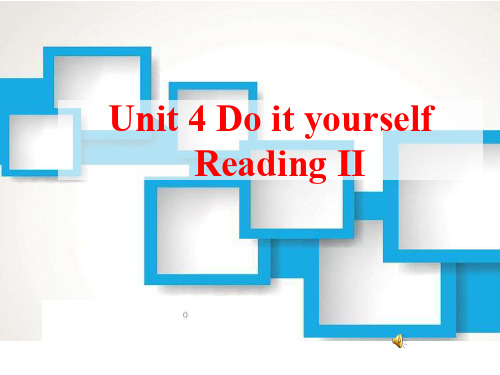
课程
in DIY
建议某人做某事
advise sb to do sth
advise sb to do sth He advised me to buy a computer. We advised them to start early.
Para.5 I __a_d_v_i_s_e_d__ him to _t_a_k_e_a__c_o_u_r_se__in__D_I_Y__. He says he _k_n_o_w_s__ev_e_r_y_t_h_i_n_g_a_b_o_u_t__it_.
Retell the text paragraph using these key words and useful phrases.
Paragraph 2: a brighter light, make a mistake, power
cut, put up a picture, hit a pipe, fill … with…
Enjoy DIY! Making a love envelope
Making a card for your mum.
Enjoy fun in DIY! Be careful with DIY!
Fixing a bicycle
Making things from old clothes
Retell the text paragraph using these key words and useful phrases.
Paragraph 1: be crazy about, repair,
decorate, look terrible
make a mistake He was unhappy because he made a _m__is_t_a_k_e.
八年级英语上册unit4 reading(2)学案
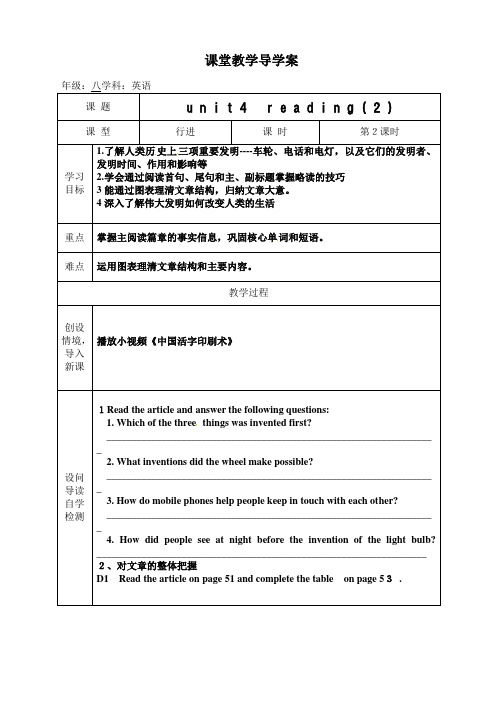
课堂教学导学案1.了解人类历史上三项重要发明----车轮、电话和电灯,以及它们的发明者、发明时间、作用和影响等2.学会通过阅读首句、尾句和主、副标题掌握略读的技巧3能通过图表理清文章结构,归纳文章大意。
4深入了解伟大发明如何改变人类的生活掌握主阅读篇章的事实信息,巩固核心单词和短语。
1Read the article and answer the following questions:1. Which of the three things was invented first?_________________________________________________________________ _2. What inventions did the wheel make possible?_________________________________________________________________ _3. How do mobile phones help people keep in touch with each other?_________________________________________________________________ _4. How did people see at night before the invention of the light bulb? __________________________________________________________________ 2、对文章的整体把握D1 Read the article on page 51 and complete the table on page 53.D1第三空People have been able to speak to each otherover long distances. They allow people to keepin touch with each other anytime, anywhere.(需要把这两个句子合并成一个句子。
八年级英语译林版上册Unit4_Reading2_优质课教案(江苏省)

Unit4 Reading2 优质课教案(江苏省)8A Unit 2 School lifeReading ⅡHuai’an Auroral Bilingual School You Fen Teaching material:8A Unit 2 School life ReadingⅡTeaching Objectives:By the end of the lesson, students should be able to1. further understand the whole text.2. use some important words and phrases correctly.3. talk about one’s dream school life and enjoy school life.4. develop and cultivate their quality of thinking via reading, communication and other activities.Key points:Students can use the important words and phrases correctly to talk about their dream school life.Difficult points:To develop and cultivate students’ quality of thinking via reading, communication and other activities.Teaching procedures:Step 1. Lead-in1. Watch a video about the life in Rishworth School.2. Encourage students to talk about their school life.(The purpose is to arouse students’ interest and attract them to the topic.)Step 2. PresentationTask 1: Read and learn1. Complete the mind-map about the two schools.2. Fill in the blanks about the special subjects and clubs of the two school.3. Learn some language points.3. Have an interview about their own favorite subjects and clubs.4. Try to retell the wonderful activities of the two schools using the given phrases.(The purpose is to reinforce the understanding of the text and learn to use the words and phrases.)Task 2: Read and think1. Read the text again and discuss more details about the text.2. Learn some language points.3. Complete the short passage “Our colorful school life” with the learnt phrases. (The purpose is to cultivate students’ quality of thinking and encourage students to practice using words and phrases learnt previously.)Step 3. PracticeTask 3: Think and create1. Think about what a good school is like.A good school is like a great tree. It’s a great place to grow up.A good school is like a window. It’s a nice place to know about the world. …2. Discuss what makes a good school life in pairs.Good facilitiesGood teachers Good activities …(The purpose is to lead students to develop their ability to imagine and love their school.) Step 4. ProductionImagine your dream school life in groups and report.(The purpose is to encourage students to enhance their comprehensive language application.)Step 5. HomeworkWrite a letter to tell your e-friend about your dream school life.(The purpose is to consolidate and reflect on what they have learnt.)Blackboard Design:8A Unit 2 School lifeReading Ⅱ。
- 1、下载文档前请自行甄别文档内容的完整性,平台不提供额外的编辑、内容补充、找答案等附加服务。
- 2、"仅部分预览"的文档,不可在线预览部分如存在完整性等问题,可反馈申请退款(可完整预览的文档不适用该条件!)。
- 3、如文档侵犯您的权益,请联系客服反馈,我们会尽快为您处理(人工客服工作时间:9:00-18:30)。
8A Unit 4 Wild animalsReading(2) 导学稿一、学习目标1、学习并掌握下列单词和短语:weigh(称量,重),gram(克),kilogram(千克)start(开始), giant(巨大的),milk(乳汁,牛奶),fur(皮毛),forest(森林),baby,outside,bamboo,bamboo shoot,leaf,sadly,survive,hunter,kill,farmer,forest,nowhere,following,action,protect,reserve,encourage,thick,continue.2、了解大熊猫的成长过程及保护大熊猫的一些措施,从而增强保护意识。
二、预习辅导(一)语言点导学1、When Xi Wang was 20 months old,she had to look after herself beacause her mother had another baby.当希望20个月大时,她必须自己照顾自己,因为妈妈又生了一个幼崽。
①这是一个含有状语从句的复合句,其中when引导______从句,because引导_______从句.②had another baby 又生了一个幼崽。
生孩子:have a baby③不得不,必须:have to 表示客观上不得不,可用于各种时态,否定和疑问句要借助助动词must表示主观上必须,只用于一般现在时,否定中在must后加not和疑问句时把must提前④other ,the other,another 的区别other形容词“别的,其他的”,后可加单数或复数名词。
如:一些别的人:some other people,what other thing 泛指某范围中的一部分,不是剩余的全部。
the other 可作“代词”代替单数,意思:另一个(两个中的另一个),其复数为the others,指两部分中另一部分(即剩余的全部)也可做“形容词”后+单数名词或复数名词,即the other = the other+n(可数单数);the others =the other +n(可数复数)another +单数或复数名词,指把事物或人分成三部分或三部分以上,泛指其中的一部分,不是剩余的全部。
例句:Some students are reading ,some other students are talking.Some students are reading,the other students are playing.Some students are reading ,some students are writing,another students are playing.2、Here are some of problems that Xi Wang may have in the future if she lives in the wild.下面就是希望在未来可能会遇到的一些问题,如果她在野外生活的话。
In the future:指将来的某一时间,意为“将来”可放于句首或句尾。
In future :指全部的将来,意为“从今以后”也可用“for the future”如:谁能说出将来会发生什么事?Who can tell what will happen ____ ____ ____ ?他同意今后给我更多帮助。
He agreed to give me more help ____ ____ ?3、Mothers often leave baby pandas for two whole days on their own.熊猫妈妈经常让自己的孩子单独呆两天。
该句子中的leave意思:留下,落下。
leave …+ 介词+ 地点意思:把……落/丢在某地。
我把书包落在教室里了。
________leave … with/to sb 意思:把……留下交由某人管。
妈妈把小妹妹交我照顾。
_________leave … for sb 意思:把……留给某人。
你能把这些钱留给我吗?_______________4、If people find baby pandas alone,they will often take them away.如果人们发现小熊猫落单,通常会把它们带走。
① find sb/sth +adj.表示“发现某人/某物处于某种状态”短语中的adj是宾语补足语。
如:我发现她的房门是开着的。
I found her door _____(open).② alone 意思“独自/单独”(1)可用作adj,作表语/宾语补足语。
(2)可用作adv,修饰动词。
lone 意思“孤单的,孤独的”只作adj,只用于名词前(即只作定语)lonely 意思“孤独的,独自一个人的;偏僻的”adj可用作表语和定语。
带有浓烈的感情色彩,强调孤单。
如:一个孤单的孩子,独自居住在这个旧房子里,他很孤单。
A _____ child lives in an old house ______, he is very _________ 。
③take away意思:带走,拿走。
5、keep someone/something safe from danger.使某人或某物脱离危险。
1) keep sb/sth +adj 使某人或某物保持某种状态。
如:让我们保持我们的教室安静。
Let’s ______ our classroom ______ .2) danger是不可数名词,其形容词为________。
①短语:处于危险中用 in danger,②处于……的危险中:in danger of …如:病人有死亡的危险。
The patientis in danger of death.③在某方面有危险…danger in doing …如:攀岩是非常危险There is lots of danger in climbing.④脱离危险用“out of danger”,没有危险用“in no danger/free from danger/without danger ”6、continue to live继续活下来。
continue doing/to do sth 继续做某事。
(二)预习自测1、再次阅读课文, 回答问题. 巩固文章1)When did the writer first see the baby panda? 2)What did the baby panda look like?3)Why did the writer call her Xi Wang? 4)When did Xi Wang start to go outside her home?5)Can you say something about the Giant Panda when she was 8 months old?6)How many hours did Xi Wang drink milk at the very beginning?7)What did she eat when she was six months old?8)Why did Xi Wang have to look after herself when she was 20 months old?9)Why is it very difficult for giant pandas to survive in the wild?10)What are the 3 problems will Xi Wang face in the future?11)Why did hunters kill giant panda?12)Why did mother panda leave baby pandas for two whole days on their own?13)What actions can we take to protect the giant pandas?14)What will happen if we do nothing to help pandas?2、按时间顺序用自己的语言叙述一下希望的成长过程。
三、合作交流1、学习学习目标。
2、展示预习作业。
3、完成62页E部分。
四、当堂练习复述大熊猫保护措施,并完成62页的D部分。
五、课堂小结学完本节课,你学到了什么?都有哪些收获?还有哪些疑问?请认真想一想,把它们都写下来。
___________________________________________________________________________________________________________________________________________________________8A Unit 4 Reading(2)课堂校本作业三、阅读并背诵课文,写一写熊猫“希望”的成长过程。
When Xi Wang was born, she ______________________________________________.When she was 10 days old, she _____________________________________________.At four months, she weighed _________________ and started to ___________________for the first time.When she was six months old, she ate _________________________________________Eight months later, she was not ________________ and grew into ___________________and she wighed _____________________.When she was 20 months old, she had ___________because her mother ______________四、根据汉语提示,写出正确的单词。
1. A baby panda is only 100 ________ (克) at birth, do you know?2. Giant pandas love to eat _________(竹子) _________(竹笋) and leaves.3. _________(杀死) the birds is not right.4. Some _________(猎人) kill pandas for their ________(皮毛)5. Maybe someday these animals will be ________(无处) to be found.6. Can you answer the ________(以下的) questions?7. Doing eye exercise is good for ________(保护) our eyes.8. They are building more ________(保护区) for wild animals.9. It’s our turn to take some ________(行动) to help the animals.10. His parents often _________(鼓励) him to be more active in everything.11. A bear has long and _________(厚的) hair on its body.12. I had a call just now. After that , I _________(继续) to eat my lunch.13. A reserve is a ________(特别的) areas for wild animals.14. _________(令人难过的是), farmers cut down trees and __________(森林).五、选词组,并用正确的形式填空。
